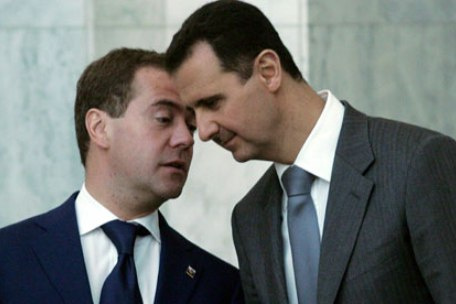Options for Bashar al-Assad: International mediation or power-sharing

IRD: The Europeans have thoroughly entered the Syrian case: the US, French, UK and German ministers of foreign affairs, and the chairman of the Arab League's Ministerial Council have participated in an ad hoc meeting with Russian officials while proposing Syria’s issue in the UN Security Council, in order to convince Russia not to veto a resolution. Meanwhile for resolving the current crisis, Moscow has proposed a gathering in Moscow to discuss a common solution. Every day, Syria’s case enters a new phase considering the several pretexts presented by the Arab League and political challenges of the EU. The meeting of the Security Council has been concluded without any particular results for bringing China and Russia along with the other members’ position, and has been postponed to the day after. The verbal back and forth between the Syrian representative in the Council and the opponents of al-Assad have added to the existing tensions. What are the scenarios available to Syria? Does this game benefit al-Assad or will some prescription against the desires of the president be made up? These are the questions reviewed in this interview.
IRD: Considering the proposal of today’s review of the resolution against Syria, what is the main reason that Russia has opposed the mediation between the Syrian government and opponents?
MS: From the very first days of the crisis in Syria and the attention of the international community to this issue, Russia has attempted to control the issue so that the Syrian government’s opponents could not make a fundamental change in the structure of the country’s policies, since Syria is one of the most important bases for Russia in the Middle East and there extensive political, economic and strategic relations between these two countries. In the beginning, the most important attempt by Russia has been preventing the passing of a Security Council’s resolution via using the veto right and not allowing Syria’s case be an international issue, although after the intensification of the crisis and struggles in Syria, the Russians have tried their best to control the situation. One of the measures taken by Russia has been to invite both sides involved in the crisis to negotiate in Moscow; however, the country hosted the Syrian opponents before and officials negotiated with them, while now Russia is trying to prepare a face-to-face meeting with the opponents and Syrian officials, a proposal that has been welcomed by the Syrian government, but rejected by the protestors. The proposal for a new resolution in the Security Council has created a situation in which the international supporters of the Syrian opponents and those of the government try their best to control the issue in one way or another. In the status quo, considering that Russia does not seem to successfully act in the mediation case, it will probably attempt again to prevent the issuance of a resolution against Syria in the Security Council.
IRD: Does Russia really think that the regional measures such as those by the Arab League or Russia can halt the process of internationalization of the Syrian crisis?
MS: Russia’s viewpoint is not necessarily prevention of this while it is now proposed internationally; turning from a national crisis into an issue heeded severally by the Security Council. However, Russia experiences an ambiguity in its relations with Syria and this situation is not desirable for a country like Russia. With the fewest countries having relations with the Syria, Russia should try its best to control the situation without any fundamental changes in its foreign policies and the type of its relations with the country.
IRD: Considering that previously Moscow vetoed the resolution of the Security Council against Syria, can it be stated that the mediation proposal has been carried out to veto the new resolution, or is it a mere attempt to make some adjustments in the content of the resolution and to include the mediatory measures within?
MS: Currently, Syria’s case is like a chess game for all sides, any of which trying to counteract against the other. Issuance of the resolution against Damascus has severally been proposed in the Security Council, as the West has attempted many times to propose Syria’s case in the council. On the other hand, the Russians also tried to divert the case by preparing a draft of the resolution and to follow its objectives through proposing the mediation issue, while no practical result has been obtained after all these measures.
IRD: How can the proposal of mediation be interpreted as an ultimatum for al-Assad, and how does the rejection of the proposal by the Syrian opponents affect Russia’s position?

